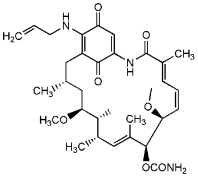产品说明书
FAQ
COA
已发表文献
产品描述
17-AAG又称为Tanespimycin、CP 127374,是一种有效的Hsp90抑制剂(IC50=5 nM)。17-AAG作用于肿瘤细胞Hsp90的亲和力比作用于正常细胞中Hsp90亲和力高100倍,另外,17-AAG还能抑制Akt活化及HER2、ErbB2表达。17-AAG抑制多种癌细胞生长,如神经胶质瘤细胞等,在体内外表现出明显的抗肿瘤活性。另外,17-AAG与大量抗癌药如UCN-01,依托泊苷(etoposide),顺铂(cisplatin)显示协同作用。
17-AAG是格尔德霉素(geldanamycin)的半合成类似物,具有更低的体内毒性和更强的稳定性,目前已用于乳腺癌等疾病Phase II研究阶段。
【该产品仅用于科研实验,不能用于人体】
产品性质
|
英文别名(English Synonym) |
Tanespimycin, CP 127374, KOS-953, NSC 330507, CNF-101, GLD-36, BMS 722782 |
|
化学名(Chemical Name) |
17-demethoxy-17-(2-propenylamino)-geldanamycin |
|
靶点(Target) |
Hsp90 |
|
CAS 号(CAS NO.) |
75747-14-7 |
|
分子式(Molecular Formula) |
C31H43N3O8 |
|
分子量(Molecular Weight) |
585.69 |
|
外观(Appearance) |
紫色固体 |
|
纯度(Purity) |
>98 % |
|
溶解性(Solubility) |
溶于DMSO |
|
结构式(Structure) |
|
运输与保存方法
粉末直接保存于-20 ºC,有效期2年。易溶于DMSO。建议分装后-20ºC避光保存,避免反复冻存,至少可存放6个月。
注意事项
1)为了您的安全和健康,请穿实验服并戴一次性手套操作。
2)粉末溶解前请先短暂离心,以保证产品全在管底。
3)本产品仅用于科研用途,禁止用于人身上。
使用浓度
【具体使用浓度请参考相关文献,并根据自身实验条件(如实验目的,细胞种类,培养特性等)进行摸索和优化。】
相关实验(数据来自于公开发表的文献,仅供参考)
(一)细胞实验(体外研究)
1)为检测肿瘤细胞中Hsp90对17-AAG的亲和力,10μM 17-AAG分别用于抑制肿瘤细胞和正常细胞Hsp90活性,17-AAG作用于肿瘤细胞Hsp90的亲和力比作用于正常细胞中Hsp90亲和力高100倍。[2]
2)为研究17-AGG对Akt蛋白表达的作用,分别用1 μM 17-AAG处理乳腺癌细胞系(MCF-7和 MDA-468),50 nM 17-AAG处理SKBr-3和BT-474细胞,17-AGG诱导Akt蛋白表达降低,而且磷酸化Akt水平下降。[3]
(二)动物实验(体内研究)
体内研究中,给小鼠腹腔注射(i.p.)17-AGG(75 mg/kg/day),17-AGG以剂量依赖的方式抑制移植瘤的生长。[3]
参考文献
[1] Schulte et al. The benzoquinone ansamycin 17-allylamino-17-demethoxygeldanamycin binds to HSP90 and shares important biologic activities with geldanamycin. Cancer Chemother Pharmacol. 42(4):273-279(1998).
[2] Kamal A, et al. A high-affinity conformation of Hsp90 confers tumour selectivity on Hsp90 inhibitors. Nature 425: 407-410 (2003).
[3] Basso AD, et al. Ansamycin antibiotics inhibit Akt activation and cyclin D expression in breast cancer cells that overexpress HER2. Oncogene 21: 1159-1166 (2002).
[4] Jia W, et al. Synergistic antileukemic interactions between 17-AAG and UCN-01 involve interruption of RAF/MEK- and AKT-related pathways. Blood. 102(5):1824-32(2003).
[5] Qing Y, et al. Synergism between Etoposide and 17-AAG in Leukemia Cells: Critical Roles for Hsp90, FLT3, Topoisomerase II, Chk1, and Rad51. Clin Cancer Res, 13:1591-1600(2007)
[6] Vasilevskava et al. Quantitative effects on c-Jun N-terminal protein kinase signaling determine synergistic interaction of cisplatin and 17-allylamino-17-demethoxygeldanamycin in colon cancer cell lines. Mol Pharmacol 65(1):235-43(2004).
[7] Zsebik B, et al. Hsp90 inhibitor 17-AAG reduces ErbB2 levels and inhibits proliferation of the trastuzumab resistant breast tumor cell line JIMT-1. Immunology Letters 104(1–2): 146–155(2006).
HB181204




